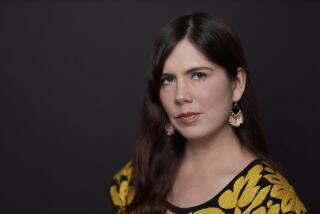A gift guide for adventurous readers
This year for the holidays, I’m looking at what we might call books for adventurous readers, although the truth is that all readers are adventurous. What is reading, after all, if not an adventure, a journey out of our own psyche and into that of another human being? It is as close as we get, John Green has suggested, to a supernatural experience, in which we both possess and are possessed by someone else.
Joe Ollmann may be my favorite contemporary comics artist — smart, self-lacerating, nuanced, a storyteller of uncommon sensitivity. His new book “Happy Stories About Well-Adjusted People” (Conundrum, 244 pp., $20 paper) is a superior follow-up to his graphic novels “Mid-Life” and “Science Fiction”: a collection of eight long stories about people on the edge. Ollmann’s characters are lost and know it; in “Johnny Pinetop,” a ventriloquist gets in a fight at a child’s birthday party, while ‘Big Boned” traces the petty degradations of an overweight young woman in a world of ridiculous ideals. “Sometimes you can feel bad, one of his characters says, “even when you haven’t done anything wrong.”
Kerry Howley’s “Thrown” (Sarabande: 282 pp., $25.95 paper) is another book that comes out of the fringes — an extended piece of literary reportage on the world of mixed martial arts. In some sense, it’s reminiscent of James McManus’ “Positively Fifth Street,” which took a similar approach to the World Series of Poker, but Howley is more observer than participant. Or no, not observer, because she gets involved in the lives of her subjects; her emotional journey is a key aspect of the book. Funny, sad, sharply rendered, “Thrown” does what all literature aspires to do — to bring us into a community, a universe, we did not know we cared about and in the end leave us shattered and revealed.
Speaking of shattered, Judith Kitchen’s “The Circus Train” (Ovenbird Books: 180 pp., $15 paper) is among the most stunning meditations I’ve encountered, a long essay (published here with two companion pieces) on illness and mortality. And yet, Kitchen, who died last month at age 73, is not interested in dying so much as living — or more accurately, in living in the shadow of her own demise. That this is true for all of us goes without saying, but here, Kitchen pulls off the elusive feat of writing both personally and universally, representing her memories while also making them ours. “We take from the box of photos,” she tells us, “those that lead, one to another. We leave behind the singular, solitary moments that go nowhere except into, and out of, themselves.”
Sam Sweet’s “All Night Menu” (All Night Menu: 64 pp., $20 paper) looks at memory through a different filter: that of the forgotten histories of Los Angeles. The first of a projected five volumes, it gathers eight stories, each keyed around a particular street address. The narratives here are small, constrained, like the lives they seek to resurrect. There is Patricia McCormick, a female bullfighter, or the members of the oldest gang in L.A. “The city is vast and amorphous,” Sweet has written. “The booklet is small and precise. It is not a walking tour, a visitor’s guidebook, or a street atlas. It is a periodic index of lost heroes and miniature histories.”
Something similar might be said about “The Honest Pint” (Tavern Books: $60 annual subscription), a monthly broadside on poetics edited by Matthew Dickman. The most recent issue features an essay by Matthew Zapruder and a “one-question interview” between Ben Lerner and Ed Skoog. What’s great about “The Honest Pint” is not just the contributors it has attracted (Albert Goldbarth, Diane Wakowski) but also the offhand, playful way it articulates its concerns. Somewhere between magazine and one-sheet, it insists that brevity is not necessarily fleeting, that we can make something resonant out of transience.
More to Read
Sign up for our Book Club newsletter
Get the latest news, events and more from the Los Angeles Times Book Club, and help us get L.A. reading and talking.
You may occasionally receive promotional content from the Los Angeles Times.






